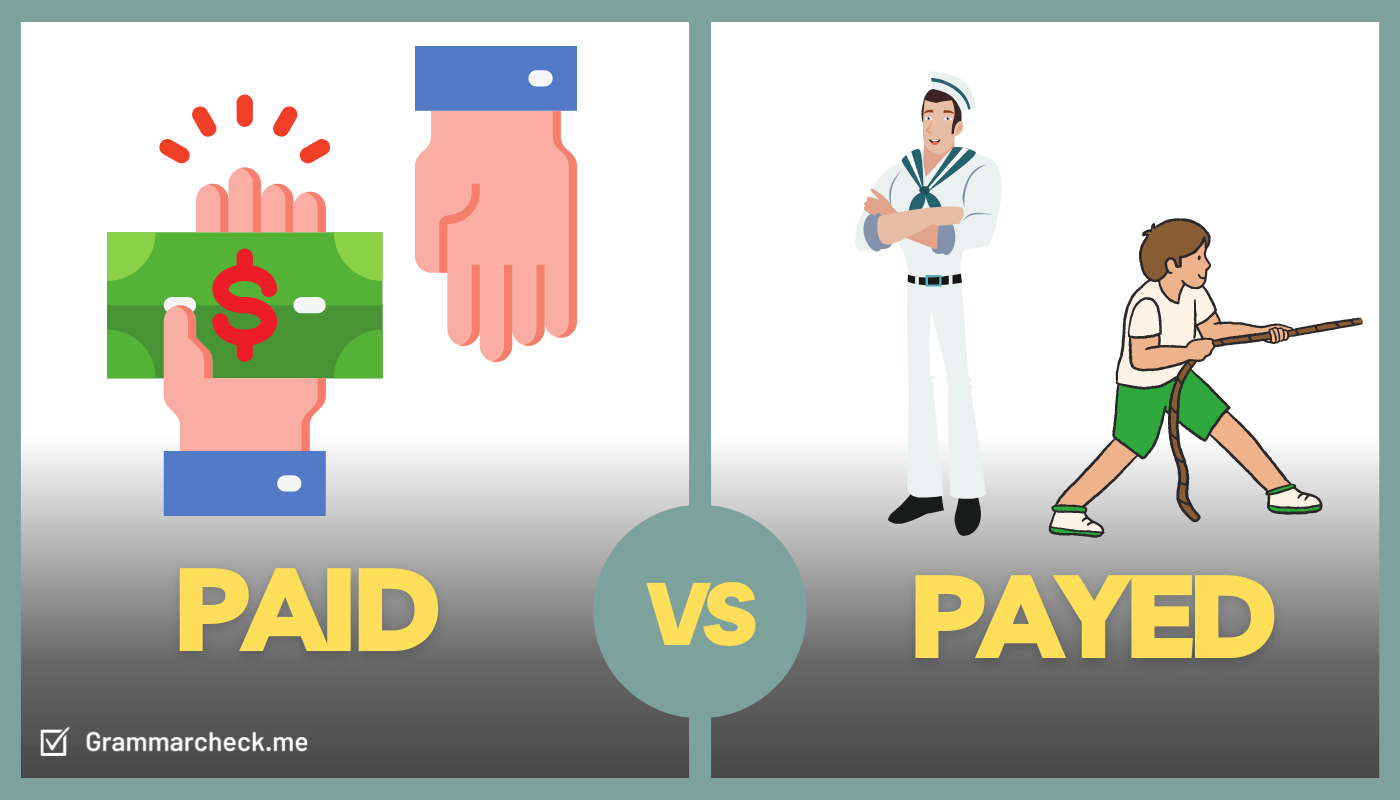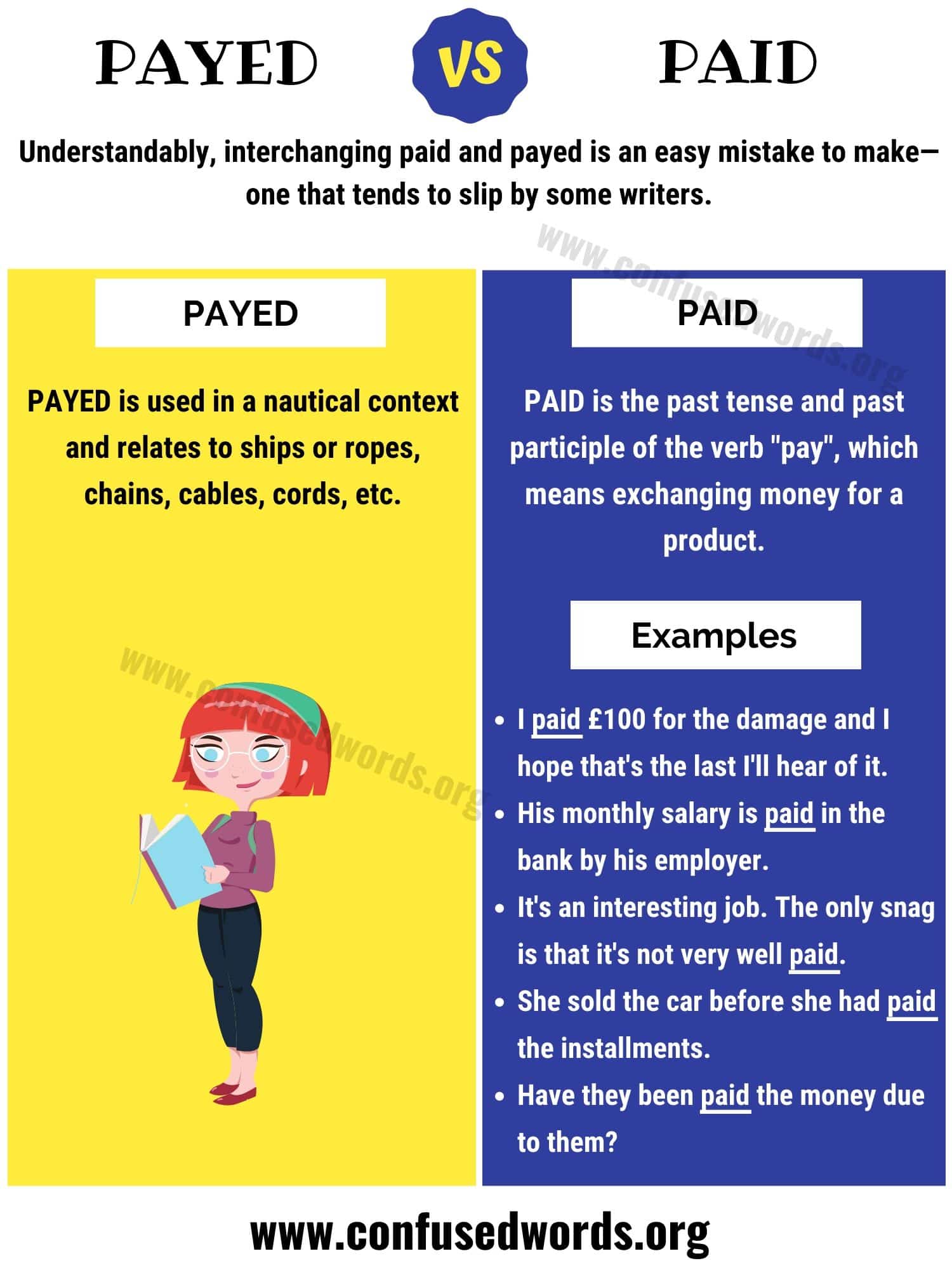Ever found yourself stuck in that awkward moment where you're trying to figure out if you should use "paid" or "payed"? You're not alone, my friend. The debate over paid or payed has been going on for years, and it's time we settle this once and for all. Whether you're writing a professional email, crafting a blog post, or just texting your buddy, getting this right can make a big difference in how you're perceived.
Let's be real here—English can be a tricky language. It's full of quirks, exceptions, and rules that seem to change depending on the situation. But don't worry, I've got your back. In this article, we're diving deep into the world of "paid" vs. "payed," breaking down the rules, and giving you the confidence to use these words like a pro.
By the time you finish reading, you'll know exactly when to use "paid" and when "payed" is the way to go. Plus, we'll cover some fun facts, common mistakes, and even throw in a few examples to help everything stick. So, grab your favorite drink, sit back, and let's get into it!
Read also:Russian Lathe
What’s the Difference Between Paid and Payed?
Alright, let's start with the basics. Both "paid" and "payed" are past tense forms of the verb "pay," but they're not interchangeable. Here's the deal: "paid" is the more common form and is used in most contexts, while "payed" is mainly reserved for nautical terms or very specific situations. Crazy, right?
Think of it like this: if you're talking about money, bills, or anything financial, "paid" is your go-to word. But if you're discussing sailing or maritime activities, "payed" might make an appearance. We'll dive deeper into this later, but for now, just remember that "paid" is your default choice.
When to Use Paid
Let's talk about "paid" because, let's face it, this is the word you'll be using 99% of the time. "Paid" is the past tense and past participle of "pay," and it's used in all standard English contexts. For example:
- I paid my rent last week.
- She has paid off her student loans.
- They paid the bill in full.
See how natural that sounds? That's because "paid" is the correct form for most situations. Whether you're talking about paying for groceries, settling a debt, or covering expenses, "paid" is the word you want.
When to Use Payed
Now, let's tackle the rare bird: "payed." This one pops up primarily in nautical contexts, where it refers to sealing or caulking a ship's seams with tar or pitch. Yeah, I know, not exactly everyday language, but it's still worth knowing. For example:
- The sailors payed the deck to protect it from water damage.
- He payed the hull with a fresh layer of tar.
Outside of maritime terminology, "payed" is rarely used. If you find yourself using it in a non-nautical context, chances are you're making a mistake. Stick with "paid" unless you're specifically talking about ships and sealing.
Read also:Is Ross Marquand Gay
Common Mistakes People Make
Let's be honest—mistakes happen. Even the best writers slip up from time to time. Here are some of the most common errors people make when using "paid" and "payed":
- Using "payed" when they mean "paid." This is by far the most common mistake. Remember, "payed" is only for nautical stuff.
- Overthinking it. Sometimes, people get so caught up in trying to decide between "paid" and "payed" that they end up using neither. Just stick with "paid" and you'll almost always be good.
- Forgetting the context. If you're writing about money, always go with "paid." If you're writing about ships, then—and only then—consider "payed."
Trust me, once you get the hang of it, these mistakes will become a thing of the past. Practice makes perfect, right?
Examples in Context
Nothing drives a point home like a good example. Here are some sentences that show "paid" and "payed" in action:
Examples of Paid
- I paid my credit card bill on time this month.
- She paid the cashier with a credit card.
- We paid our respects at the memorial service.
Examples of Payed
- The crew payed the ship's seams to ensure it was watertight.
- He payed the mast with a thick layer of protective coating.
See how different they are? "Paid" is all about money and transactions, while "payed" is about ships and sealing. Easy peasy!
Historical Context of Paid and Payed
Now, let's take a little trip back in time. The word "pay" comes from the Old French "paille," which itself derives from the Latin "pacare," meaning "to pacify." Over time, the word evolved to mean "to settle a debt" or "to compensate." The past tense "paid" became the standard form for most uses.
On the other hand, "payed" emerged specifically in the context of maritime activities. Sailors used it to describe the process of sealing ship seams with tar or pitch to prevent leaks. This specialized usage has kept "payed" alive in nautical circles, even as "paid" became the dominant form in everyday language.
Grammar Rules You Need to Know
Grammar might not be the most exciting topic, but it's essential if you want to use "paid" and "payed" correctly. Here are the key rules you need to remember:
- Use "paid" as the past tense and past participle of "pay" in all standard contexts.
- Use "payed" only in nautical contexts or when referring to the act of sealing with tar or pitch.
- When in doubt, default to "paid." It's almost always the right choice.
These rules might seem simple, but they'll save you from a lot of headaches down the line. Trust me, your English teacher will be proud.
How to Avoid Confusion in the Future
So, how do you make sure you never mix up "paid" and "payed" again? Here are a few tips:
- Remember the nautical connection. If you're not talking about ships, "payed" is off the table.
- Practice using both words in sentences. The more you practice, the more natural it will feel.
- Use grammar tools or apps to double-check your work. Sometimes, a second set of eyes (even digital ones) can catch mistakes you might miss.
With these strategies in place, you'll be using "paid" and "payed" like a pro in no time.
Fun Facts About Paid and Payed
Who says grammar can't be fun? Here are a few fun facts about "paid" and "payed" that might surprise you:
- "Paid" is one of the most commonly misspelled words in English. People often confuse it with "payed," especially when typing quickly.
- The nautical use of "payed" dates back to the 16th century, when sailing was a major part of global trade.
- Even native English speakers struggle with "paid" vs. "payed," so don't feel bad if you need a refresher from time to time.
Grammar doesn't have to be boring, right?
Conclusion: Paid or Payed—You’ve Got This
Alright, we've covered a lot of ground here. To recap:
- Use "paid" for all standard contexts, especially when talking about money or transactions.
- Use "payed" only in nautical contexts or when referring to sealing with tar or pitch.
- Practice makes perfect, so keep using these words in sentences until it becomes second nature.
Now, it's your turn. Share this article with a friend, leave a comment, or try using "paid" and "payed" in your next piece of writing. The more you practice, the more confident you'll become. And remember, if you ever get stuck, you can always come back here for a quick refresher. Happy writing, my friend!
Table of Contents


